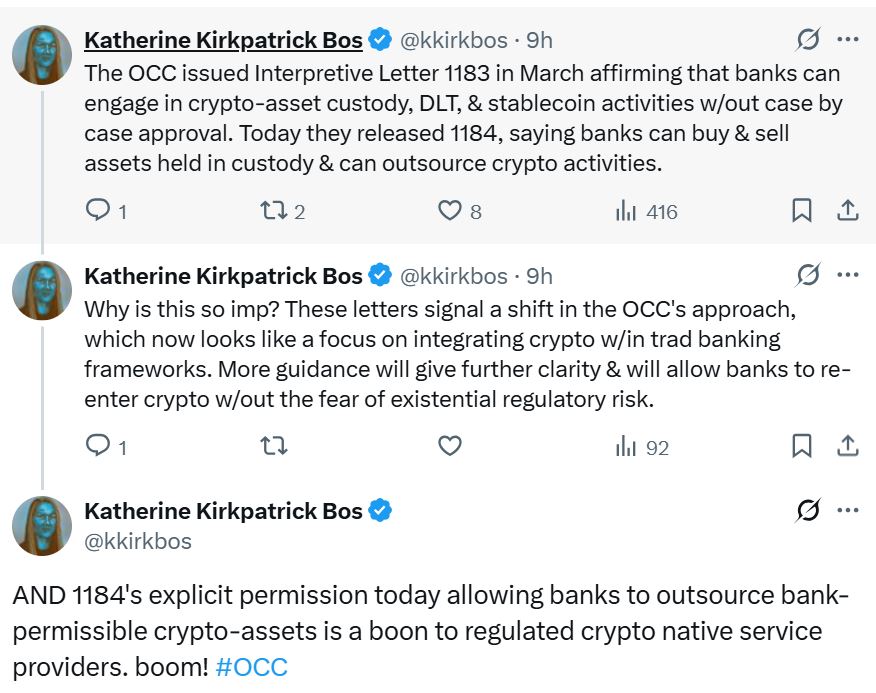The U.S. Office of the Comptroller of the Currency (OCC) has confirmed that banks under its supervision are authorized to engage with customer crypto assets held in custody, opening doors for wider adoption and integration of digital currencies within the traditional financial system.
Key Takeaways:
- OCC Authorization: National banks and federal savings associations can now buy, sell, and hold cryptocurrencies on behalf of their customers.
- Outsourcing Permitted: Banks can outsource certain crypto-related activities, such as custody and execution services, to third-party providers, provided they comply with applicable laws.
- Custody Services Expanded: Banks can offer a range of custody services, including record-keeping, tax reporting, and other related services for crypto assets.
OCC’s Position on Crypto Activities
In a letter released on May 7, Acting Comptroller Rodney Hood stated that banks and federal savings associations can buy and sell crypto assets they hold in custody at customers’ direction. This clarification provides a regulatory framework for banks to engage with cryptocurrencies, potentially attracting more customers to utilize these services.
The OCC further emphasized that financial institutions can outsource bank-permissible crypto activities, including custody and execution services, to third parties. This allows banks to leverage specialized expertise and infrastructure while maintaining regulatory compliance.
According to Hood, “These banks may provide other custody services, including record keeping, tax or reporting services for their customers.” This comprehensive approach to custody services enhances the appeal of banks as reliable custodians for crypto assets.
Industry Response
The OCC’s stance has garnered positive reactions from industry leaders. Katherine Kirkpatrick Bos, general counsel at ZK-rollup developer StarkWare, noted that the letters signal a shift in the OCC’s approach, favoring the integration of crypto within banking frameworks. She believes that further guidance will provide clarity and encourage banks to re-enter the crypto space without fear of regulatory risk.
Coinbase’s chief policy officer, Faryar Shirzad, also applauded the OCC’s commitment to regulatory clarity and adherence to supervisory best practices.

Broader Implications and Context
This decision aligns with a broader trend of increasing acceptance of cryptocurrencies within the U.S. regulatory landscape. The Trump administration has adopted a more favorable stance towards crypto, signaling a departure from previous restrictive policies.
For instance, the U.S. Federal Reserve recently withdrew guidance that was designed to deter banks from engaging in crypto and stablecoin activities. Additionally, President Donald Trump signed a joint congressional resolution overturning a Biden administration-era rule that would have required decentralized finance protocols to report transactions to the Internal Revenue Service.
What This Means for the Future
The OCC’s clarification on crypto custody services has significant implications for the future of digital assets and traditional finance:
- Increased Adoption: With banks now authorized to handle customer crypto assets, more individuals and institutions may be inclined to invest in and use cryptocurrencies.
- Regulatory Clarity: The OCC’s guidance provides much-needed regulatory clarity, reducing uncertainty and encouraging innovation within the crypto industry.
- Integration of Finance: The integration of crypto services within traditional banking frameworks can bridge the gap between the old and new financial systems.
In conclusion, the OCC’s confirmation that U.S. banks can handle customer crypto assets marks a significant milestone in the evolution of the digital asset landscape. By providing a clear regulatory framework and allowing banks to engage with cryptocurrencies, the OCC is fostering innovation, encouraging adoption, and paving the way for the integration of crypto within the traditional financial system.